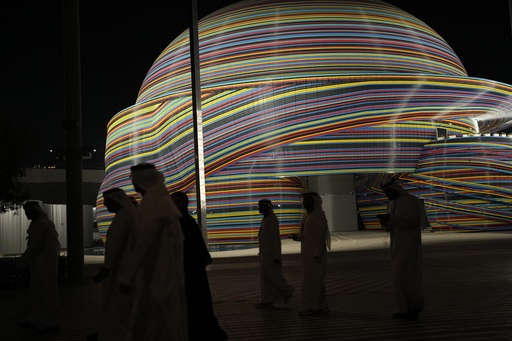COP 28: Sharp disagreements over future of planet-warming fossil fuels

People walk through the COP28 U.N. Climate Summit, Tuesday, Dec. 12, 2023, in Dubai, United Arab Emirates. AP
DUBAI, United Arab Emirates — A standoff between countries that want a dramatic phase-out of planet-warming fossil fuels and those that don’t push a critical climate summit officially into overtime on Tuesday. But organizers were about to float another try at compromise.
The United Nations-led summit known as COP28 was supposed to end Tuesday afternoon after nearly two weeks of speeches, demonstrations, and negotiations. But the climate talks almost always run long, and negotiators were still meeting late Tuesday as workers nearby dismantled signs and set up scaffolding in preparation for the venue’s next event.
Monday’s release of a draft agreement angered countries that insisted on a commitment to the rapid phase-out of coal, oil, and gas.
Another compromise version of the cornerstone document, the global stocktake, was prepped Tuesday evening, along with potential agreements about adaptation and financial aid to poor nations. Delegates, analysts, and activists hadn’t yet had a chance to see just what’s in the latest proposal from the presidency run by the host nation, the United Arab Emirates, but further negotiations were being set up after they got a look.
Meetings between delegates and the presidency were ongoing on Tuesday evening, and some were cautiously optimistic.
“I feel much more encouraged than yesterday,” said Canadian environment minister Steven Guilbeault. “I think it will be probably some hours until a new text and I suspect it will be the last,” he said around 9 p.m. Tuesday evening.
“There’s improvements in some areas from yesterday’s landings, but as I see it, it’s the whole package we want to be able to respond to,” said Samoa’s Cedric Schuster.
Monday’s criticized draft called for countries to reduce “consumption and production of fossil fuels, in a just, orderly and equitable manner” instead of a phase-out.
Majid al-Suwaidi, COP28 Director-General, said the draft was meant for countries to start talking and presenting their deal-killers.
“The text we released was a starting point for discussions,” he said at a news conference midday on Tuesday. “When we released it, we knew opinions were polarized, but what we didn’t know was where each country’s red lines were.”
“We spent last night talking, taking in that feedback, and that has put us in a position to draft a new text,” he said.
Al-Suwaidi gave conflicting comments about the future of the fossil fuel phase-out language, which at one point he said “doesn’t work.”
“It’s important that we have the right language when it comes to fossil fuels. It’s important that we think about how we get that balance. There are those who want phased out. There are those who want phased down,” al-Suwaidi said. “The point is to get a consensus.”
On one side are countries such as Saudi Arabia that won’t accept phase-out language, while European and Latin American countries and small island nations say it is unacceptable to leave those words out. Countries wanting phase-out are in a tough position because they may have to accept either a weak deal or no deal, neither of which is good for them, said Alden Meyer, a veteran climate negotiations observer for European think-tank E3G.
But Meyer thinks the blowback from phase-out supporters may be the start of strengthening a proposed deal, leaving Saudi Arabia and a few other Gulf states “as the last ones standing in the way of a more ambitious deal. We’re not there yet. There’s more work to be done.”
The key is finding language that won’t make someone block a deal because a final agreement has to be by consensus. But consensus isn’t always unanimity, with past climate summits pushing through an agreement over the objections of a nation or two, climate negotiations historian Joanna Depledge of Cambridge University said.
“Over-ruling is not impossible, just politically very, very risky,” she said.
Jean Su from the Center of Biological Diversity said, “a feasible success is some type of language that signals a phase out of fossil fuels and it will not have any abatement in it, any carbon capture and storage, something that is clean and fair.”
She said rich countries could leverage financial commitments to developing nations to help pass fossil fuel language in a final deal.
The global stocktake aims to help nations align their national climate plans with the Paris agreement goal of limiting warming to 1.5 degrees Celsius (2.7 Fahrenheit) to stave off the worst effects of climate change. Earth is on its way to smashing the record for the hottest year, endangering human health and leading to more costly and deadly extreme weather.
In the 21-page document issued Monday, the words oil and natural gas did not appear, and the word coal appeared twice. It also had a single mention of carbon capture, a technology touted by some to reduce emissions, although it’s untested at scale.
Rachel Cleetus of the Union of Concerned Scientists urged negotiators to keep working.
“Please do not shut down this COP before we get the job done,” she said.